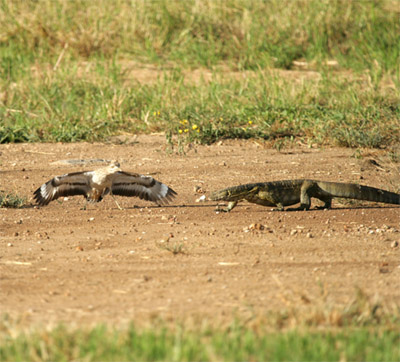We reach more than 65,000 registered users in Dec!! Register Now

For birds, predation linked to faster aging
- May 03, 2014
- 869 Views
- 0 Likes
- 0 Comment
Bird spe≠cies that suf≠fer from more preda≠t≠ion tend to age faster, a new study finds. That sup≠ports an old the≠o≠ry in≠tend≠ed to ex≠plain why an≠i≠mals have such widely var≠y≠ing life≠spans, sci≠ent≠ists claim. The re≠search≠ers could≠n't say wheth≠er the find≠ings might help ex≠plain hu≠man life≠span as well. But it seems to hold ...
Bird spe≠cies that suf¬≠fer from more preda¬≠t¬≠ion tend to age faster, a new study finds. That sup¬≠ports an old the¬≠o¬≠ry in¬≠tend¬≠ed to ex¬≠plain why an¬≠i¬≠mals have such widely var¬≠y¬≠ing life¬≠spans, sci¬≠ent¬≠ists claim.
The re¬≠search¬≠ers could¬≠n't say wheth¬≠er the find¬≠ings might help ex¬≠plain hu¬≠man life¬≠span as well. But it seems to hold ‚Äúat least in birds, where the nec¬≠es¬≠sary da¬≠ta are avail¬≠a¬≠ble for many spe¬≠cies‚ÄĚ-some 1,400 of them, whose longe¬≠vi¬≠ties vary by some 25-fold, ac¬≠cord¬≠ing to a state¬≠ment from the Max Planck In¬≠sti¬≠tute for Or¬≠nith¬≠ol¬≠o¬≠gy in Seewiesen, Germany, where the study was con¬≠ducted.
‚ÄúWe were able to con¬≠firm‚ÄĚ the the¬≠o¬≠ry ‚Äúon a broad geo¬≠graph¬≠i¬≠cal scale,‚ÄĚ said Mi¬≠hai Valcu, a co-author of the stu¬≠dy, pub¬≠lished on¬≠line April 25 in the jour¬≠nalEcog¬≠ra¬≠phy.
Some fish, tur­tles or even in­ver­te­brates can live to hun­dreds of years, while the ne­on pyg­my gob­y-a small fish-reaches ripe old age at only 60 days. In birds, par­rots such as the Sulfur-crested cock­a­too can live to over 100 years, while the small Al­len's hum­ming­bird tops out at just four.
The clas¬≠si¬≠cal ‚Äúevo¬≠lu¬≠tion ary the¬≠o¬≠ry of age¬≠ing,‚ÄĚ pro¬≠posed by ev¬≠o¬≠lu¬≠tion¬≠ary bi¬≠ol¬≠o¬≠gist George C. Wil¬≠liams over 50 years ago, claims shorter life¬≠spans will af¬≠flict adult an¬≠i¬≠mals that suf¬≠fer high preda¬≠t¬≠ion, ex¬≠po¬≠sure to par¬≠a¬≠sites and oth¬≠er ran¬≠domly oc¬≠cur¬≠ring events.
One way to look at why, is that na¬≠ture or ev¬≠o¬≠lu¬≠tion won't both¬≠er ex¬≠pend¬≠ing much ‚Äúef¬≠fort‚ÄĚ to ex¬≠tend the life¬≠span of crea¬≠tures that will probably die young an¬≠y¬≠way. Of course, that's not the real rea¬≠son, as ev¬≠o¬≠lu¬≠tion is¬≠n't con¬≠sid¬≠ered a con¬≠scious pro¬≠cess. Ev¬≠o¬≠lu¬≠tion oc¬≠curs when in¬≠di¬≠vid¬≠u¬≠als have more off¬≠spring than oth¬≠ers as a re¬≠sult of hav¬≠ing more ‚Äúfavora¬≠ble‚ÄĚ genes. This lets them spread their favora¬≠ble genes through the popula¬≠t¬≠ion, so that grad¬≠u¬≠al¬≠ly, whole spe¬≠cies change. The way those genes arise in the first place is just as any new genes do: muta¬≠t¬≠ion.
![090126173719-large[1]](http://machprinciple.com/wp-content/uploads/2014/05/090126173719-large1.jpg)
So the ag­ing the­o­ry can be ex­pressed like this: if a spe­cies suf­fers high preda­t­ion or rates of paras­itic at­tack, most in­di­vid­u­als will al­ready be killed be­fore the rare muta­t­ions that cause health­i­er age­ing can make an ev­o­lu­tion­ary dif­fer­ence.
Mi¬≠hai Valcu and Bart Kem¬≠pe¬≠naers from the in¬≠sti¬≠tute used a large da¬≠tabase on es¬≠ti¬≠mates of max¬≠i¬≠mum life-span of bird spe¬≠cies. Us¬≠ing a com¬≠plex sta¬≠tis¬≠ti¬≠cal anal¬≠y¬≠sis they found that max¬≠i¬≠mum longe¬≠vity goes down as the num¬≠ber of pred¬≠a¬≠tor spe¬≠cies with¬≠in the same ar¬≠ea goes up. The rela¬≠t¬≠ion¬≠ship held when oth¬≠er life his¬≠to¬≠ry traits known to in¬≠flu¬≠ence longe¬≠vity, such as size and clutch size, were tak¬≠en in¬≠to ac¬≠count. It al¬≠so held no mat¬≠ter how the anal¬≠y¬≠sis was done: at the spe¬≠cies lev¬≠el, at a fin¬≠er re¬≠gion¬≠al scale (groups of spe¬≠cies with¬≠in a cer¬≠tain ar¬≠e¬≠a) or even when com¬≠par¬≠ing en¬≠tire ‚Äúbiore¬≠gions,‚ÄĚ they said.
Source : http://www.world-science.net









